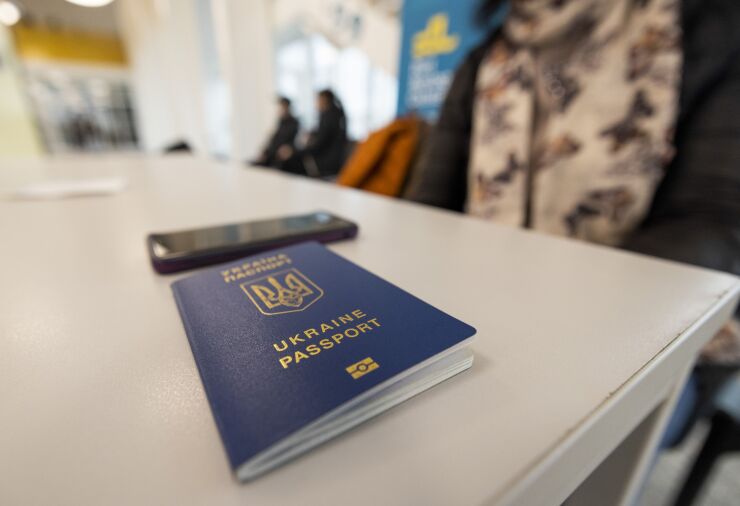
Ukrainians who flee Russia's war on their country will now be able to access credit in the U.S., the U.K. and Canada, through a partnership between Nova Credit and CreditInfo, the fifth-largest credit bureau in the world. The effort makes the credit histories Ukrainians have built up in their home country usable and readable by banks in their new homes.
As of December, more than 170,000 Ukrainian refugees had been admitted to the U.S. under a program called Uniting for Ukraine, according to the Department of Homeland Security. In the U.K., 283,366 Ukrainians have applied for a visa; as of March, 225,278 visas had been granted and 169,300 arrivals had been counted, according to the government. More than 210,000 Ukrainian nationals have arrived in Canada, and most of them do not want to return home, according to a study by Pathfinders for Ukraine. Another 726,000 Ukrainians have been approved to come to Canada but have not yet done so, according to Immigration, Refugees and Citizenship Canada.
San Francisco-based fintech Nova Credit takes credit history data from credit bureaus in migrants' home countries and translates it to credit scores and information lenders in other countries can use to make underwriting decisions.
Under Nova Credit's newly formed partnership, it will translate credit data from CreditInfo's Ukraine unit, International Bureau of Credit Histories Ukraine, which is one of the three main credit bureaus in Ukraine, into a U.S.-equivalent credit report and score so that U.S. lenders who use Nova Credit's Credit Passport can assess the credit risk of Ukrainian applicants.
Lenders that use Credit Passport today include American Express, HSBC, Scotiabank, Verizon and the United Nations Federal Credit Union. The U.N.'s credit union was the first to use it to serve Ukrainians in the U.S. The credit union declined a request for an interview or comment.
One thing that makes the war in Ukraine unique, according to
"In past refugee crises in Afghanistan, Syria and other countries, this has not been the case," he said. "Ukraine credit bureaus have great coverage."
Banks in Poland will be the first to start receiving and using the scores, which will allow Ukrainians fleeing their country to obtain credit in their new Polish homes.
To some degree, this project is personal for Esipov.
"Three of my four grandparents were born in Ukraine," he said. "I'm a Soviet Jew. So it's a complicated topic for me on a personal level. But I certainly empathize with Ukraine. I've been there many times as a kid. This is an opportunity for the company that I've built and the products that we have to have a real world impact on hundreds of thousands of people by solving a data and technology problem."
Dmitry Norenko, a Ukrainian fintech founder now based in the U.S. who is not affiliated with Nova Credit, is enthusiastic about the new effort.
"My parents just moved from Ukraine," said Norenko, whose Fort Mill, South Carolina, company, UpSwot, provides cash flow analytics for small businesses. "Getting their credit scores from Ukraine will simplify their lot dramatically. They can buy a car, they can get a credit card."
UpSwot moved about half of its Ukraine team out of the country before the war started, but about 50 employees remain and can't leave because they are men of fighting age, who are legally prohibited from departing the country. Unless they have health problems, these men are expected to fight, and some have been called up.
"Operationally, everything is good," said Norenko. "But we have some people left and that's the disaster." When employees are drafted into the military, UpSwot pays their salary for six months. "But we are a startup," Norenko said. "We can't do this endlessly. Unfortunately, 2023 was a tough year for all of us."
Nova Credit also partners with credit bureaus in Australia, Brazil, Canada, Dominican Republic, India, Kenya, Mexico, Nigeria, Philippines, South Korea, Spain, Switzerland, the U.S. and the U.K. as well as global banks, including
"The model, if executed well, allows refugees or immigrants to obtain some introductory credit," said Glenn Grossman, director of research at Cornerstone Advisors. "Score points for humanitarian efforts. The individual can now build credit within the economy of the country they now live in once they obtain credit via this model. Thus it seems like a niche, but ideal for a fintech to deliver on or possibly a community bank who wants to serve this audience."
Nova Credit also works with international students, getting them access to credit cards, housing, auto loans and such.
It took some time to build the integration with CreditInfo during a war. "We had to build new scores that are compliant with international markets," Esipov said.
FICO, the credit score company,
In Norenko's view, all the credit bureaus could be doing more to help all immigrants to the U.S.
"Ukraine is not the only nation coming to the U.S.," he said. "There are so many others that they can help. They need to change, they need to use new data sources."






